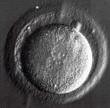March 14, 2005.

2 comments:
Joel,
I think the image that you have accompanying this piece is misleading. My inexpert understanding is that embryos at a much earlier stage of development are used. So early, they look more like clumps of cells than like an organism with even the beginnings of a head.
This is an important aspect that is often overlooked in the ethical debate. To a layman, the term "embryo" conjures up an image like the one you have shown, yet it is a far more primitive organism that is involved in actuality.
Absolutely correct and I will change it immediate. (Those of you coming in now will not know what we're talking about but I used a picture of an embryo far more advanced than what we're talking about and Graham was kind enough to point that out. I'm changing it.
J
Post a Comment